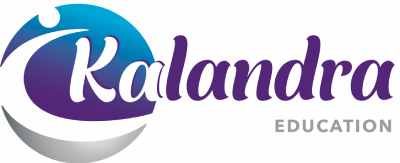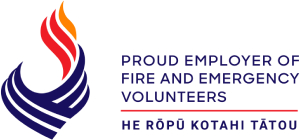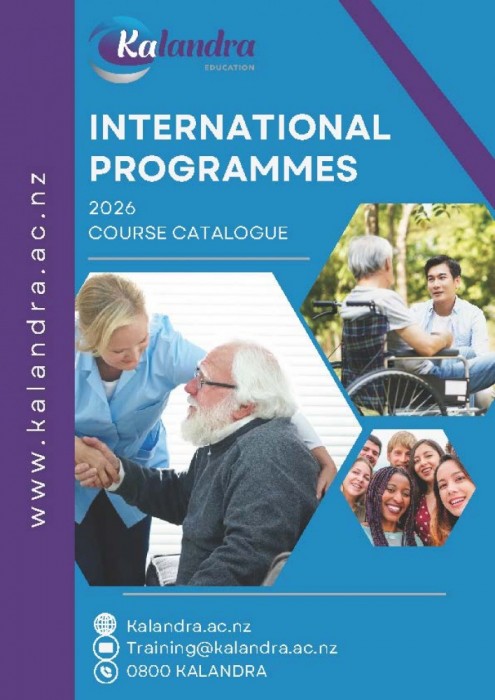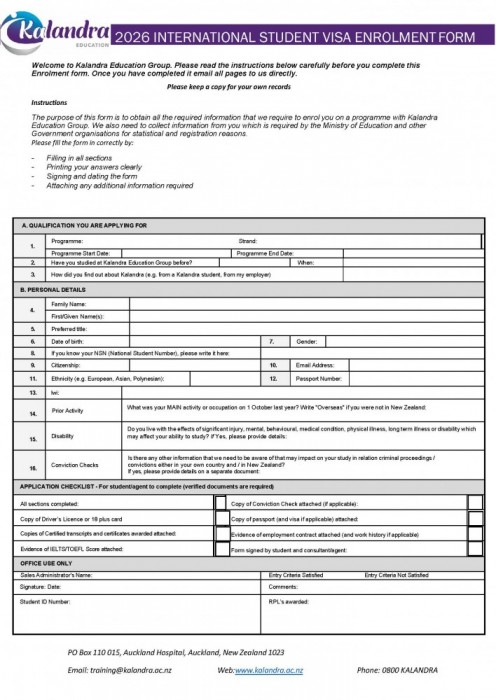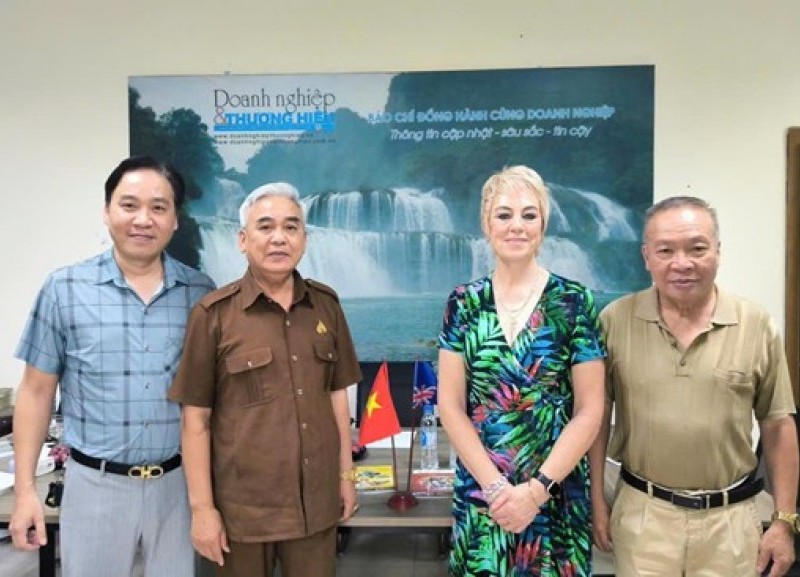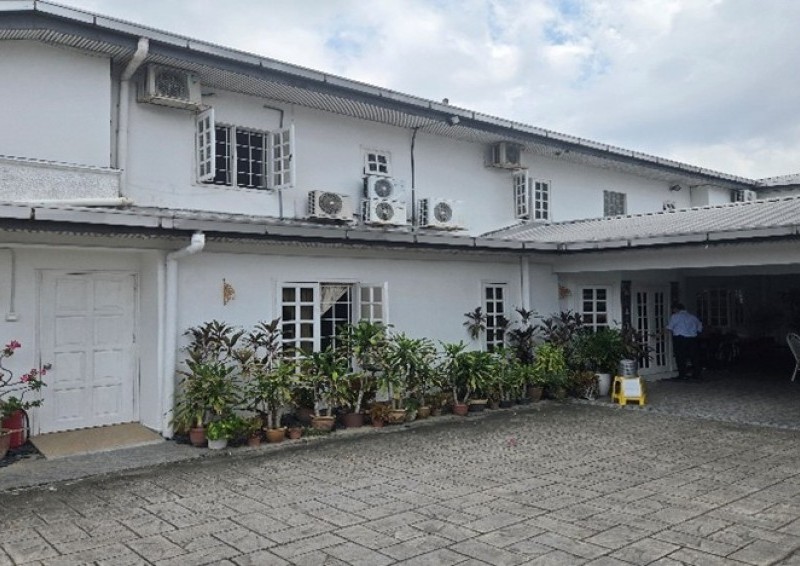Certificate in Health & Wellbeing (Level 4) with strands in Dementia Care and Diversional Therapy
2026 Programme Start Dates:
- 2 February
- 2 March
- 30 March
- 27 April
- 15 June
- 20 July
- 31 August
- 12 October
Note: all intake dates are subject to change depending on number of enrolments - additional dates have been added above and some have been altered slightly from previously advertised
Course Fees:
- Tuition = $14,000
- Course Costs = $2,250 (this includes; placement fees, police vetting, workplace scrubs, NZDRT registration)
- Travel and Medical insurance = $864.00 approx. (Southern Cross - quoted 11/07/2024) should you want us to arrange it*
Total Fees = $17,114.00
*International students must have appropriate and current travel and medical insurance for the duration of their planed period of study. Kalandra Education Group can provide travel and medical insurance through Southern Cross Travel Insurance or an alternative provider. Travel Insurance is compulsory for all international students studying at Kalandra Education Group.
Additional Costs (may occur):
Device (see at the end of the page places in NZ you can purchase a tablet or computer from)
Programme Overview
NZQF: Level 4
Total credits: 120
Delivery length: 46 weeks (including 6 holiday weeks as set prior to the programme commencing)
Total learning hours: 1200
Directed learning: Face-to-Face (in class 20 hours per week)
Work placement: will be arranged to enable you to complete your 400 hours required (non paid) should you obtain part time work (visa permitting) in Healthcare these hours maybe able to be counted
At successful completion of the Certificate in Health & Wellbeing (Level 4) with strands in Dementia Care and Diversional Therapy, students will be awarded the New Zealand Certificate in Health and Wellbeing (Social and Community Services) (Level 4).
Programme Content - compulsory components
The programme is taught over seven modules.
Module 1 - Relationships in Healthcare (24 credits)
This module is designed for students to gain a more in-depth knowledge of relationships and communication in healthcare, and to develop an understanding of their own perceptions. This person-centred approach is intrinsic to the module which consists of the following unit standards:
- Work collaboratively in a health or wellbeing setting.
- Describe relationships between practitioners, and roles and responsibilities in group processes in a health care context.
- Develop and maintain positive relationships to achieve outcomes in a health or wellbeing setting.
Module 2 - Personal Growth (18 credits)
This module is designed for students to gain a more in-depth understanding about personal growth as a worker in the healthcare industry. This person-centred module focuses on the individual, their strengths and improving their weaknesses and consists of the following unit standards:
- Demonstrate ethical practice and reflect on own ethical practice as a mental health and addiction support worker.
- Apply self-reflection in a health or wellbeing setting.
- Describe leadership in a health or wellbeing setting.
Module 3 - Contributions to the Workplace (15 credits)
Using a strength and knowledge-based approach this module, which is designed for students to gain a more in-depth understanding about the culture of service quality and safety in health and wellbeing settings, consists of the following unit standards:
- Contribute to a culture of service quality, professionalism and ethical practice in a health or wellbeing setting.
- Contribute to quality and safety in a health or wellbeing setting.
Modules 4 & 5 are completed in the elective of choice as detailed further below.
Module 6 - Communication & Engagement (17 credits)
Working in this complex environment requires a person-centred and strengths-based approach. This module is designed for students to gain a more in-depth understanding of communication and engagement with the client, family/whanau and community, and consists of the following unit standards:
- Communicate to support people’s health and wellbeing.
- Engage with tangata whenua and provide information on community support services in a health or wellbeing setting.
- Describe communication, and correct use of techniques, in de-escalation in mental health and addiction services.
Module 7 - Cultural identity and related issues (10 credits)
This module, designed for students to gain a more in-depth understanding of cultural identity and related issues, combines a person-centred and directed approach, with an awareness and knowledge of the impact of other cultures and cultural identity. This module consists of the following unit standards:
- Demonstrate knowledge of cultural identities and culture-related issues in an aged care, health, or disability context.
- Explain the impacts of colonisation on health and wellbeing for tangata whenua, and in a health or wellbeing setting.
Programme Content - elective components
Note: only one elective can be chosen for the completion of this certificate
Module 4 & 5 – Dementia Care (36 credits)
These modules are designed for students already working in, or those who intend to develop a career supporting the health and wellbeing of clients diagnosed with Dementia as well as their family and/or whanau.
Improvements in medical care and lifestyles means people are living longer and the fastest growing demographic internationally is 65 and over. With longer life spans there are also increasing numbers being diagnosed with dementia and that number is expected to triple in the next 35 years. The primary purpose of these two Health Care Support programmes is to meet the increased demand for dementia-qualified Health Care Assistants who understand the progression and effects of dementia and can provide optimal care and attention which enhances the client’s daily living experience or health outcome.
This module consists of the following unit standards:
- Person-Centred Care: Provide person-centred care, support, dignity, empathy and respect to the client, their family/whanau, and colleagues.
- Effective Capability: Maximise their effectiveness as a Health Care Assistant, provide safe and ethical practice and contribute to a constantly changing environment.
- Knowledge of Dementia Care Issues: Maintain awareness of issues affecting dementia care clients including their effects on the client and the risk of the client of vulnerability, abuse, and neglect in order to enhance their support capability.
- Communication and Support: able to acknowledge a person's culture and previous experiences, communicate effectively and provide support in a mental health/addiction and/or dementia care setting.
- Cultural Awareness: able to provide a service that respects their own and New Zealand's cultural awareness, especially the effects of Maori as tangata whenua.
- Leadership: able to exhibit personal leadership in the health and wellbeing service that demonstrates self-awareness and self-reflection.
- Ethical and Professional Conduct: able to demonstrate ethical, professional and safety orientated behaviour, contributing effectively to the health and wellbeing organisation.
- Health Sector Understanding: able to understand the role and the implications that this role has on the wider health sector.
- Effective Support and Care: able to effectively support and nurture all people living and working in the dementia care environment.
Module 4 & 5 – Diversional Therapy (36 credits)
These modules provide the opportunity to train in the planning and delivery of activities and therapies for care facility participants. For those who are working as Activity Coordinators in a care facility this qualification will support them in their roles by developing planning events and activities and a provide a deep understanding of risk identification and minimization.
With the understanding that as people age the still require activities both physical and mental in order to live a vibrant and healthy life. The Diversional therapist is a key player in the health care facility when developing a positive and stimulating environment.
This module consists of the following unit standards:
- Identify and research support services that support Diversional Therapy in a Healthcare setting.
- Describe diversional and recreational therapy.
- Develop implement evaluate and develop safety strategies in a diversional and recreational therapy setting.
- Identify safety concerns, assess risk, and develop safety strategies in a diversional and recreation therapy setting.
- Develop implement and evaluate a diversional and recreational therapy setting.
- Develop implement and evaluate a diversional and recreational therapy plan for a person experiencing grief and loss.
Recommend joining the New Zealand Society of Diversional and Recreational Therapy as early as you are able to https://diversionaltherapy.net.nz/ - it takes 12 months to be recongised as a registered Diversional and Recreational Therapist from the time you become a member.
Module 4 & 5 – Mental Health (36 credits)
These modules include understanding the impact on health and well-being of a client and the range of professional responses that are available. This training will enable graduates to develop the knowledge and skills needed to deliver the highest standard of care and support for clients diagnosed with mental health or addiction problems.
Mental health and addiction issues can affect any age or sector of society, challenging or limiting the person’s ability to function and enjoy life, as well as impacting on their family who are often struggling to provide appropriate care and manage the wide-reaching effects.
The purpose of this programme is to provide organisations, associated with mental health and addiction, with graduates who have the skills, knowledge and behaviours, including dignity, empathy and respect, that are required to work effectively in this sector, providing support to the client, family/whanau, and colleagues.
Working in mental health is a challenging and rewarding occupation. This programme enables students who have some prior experience from working in a health and wellbeing setting, to further their knowledge, skills and working opportunities by extending into the mental health and addiction sector, meet Kalandra values and set the standard across the sector.
The modules contain the following unit standards:
- Behavioural Management: Manage mental health and addiction clients and behaviours in a care facility or in the client’s home.
- Person-Centred Care: Provide person-centred care, support, dignity, empathy and respect to the client, their family/whanau, and colleagues.
- Effective Capability: Maximise their effectiveness as a Health Care Support Worker, provide safe and ethical practice and contribute to a constantly changing environment.
- Knowledge of Mental Health Issues: Maintain awareness of issues affecting mental health clients including their effects on the client, and the risk of the client of vulnerability, abuse, and neglect in order to enhance their support capability.
- Communication and Support: Graduates will be able to acknowledge a person's culture and previous experiences, communicate effectively and provide support in a mental health and addiction care setting.
- Cultural Awareness: Graduates will be able to provide a service that respects their own and New Zealand's cultural awareness, especially the effects of Maori as tangata whenua.
- Leadership: Graduates will be able to exhibit personal leadership in the health and wellbeing service that demonstrates self-awareness and self-reflection.
- Ethical and Professional Conduct: Graduates will be able to demonstrate ethical, professional and safety orientated behaviour, contributing effectively to the health and wellbeing of the organisation.
- Health Sector Understanding: Graduates will be able to understand the role and the implications that this role has on the wider health sector.
- Effective Support and Care: Graduates will be able to effectively support and nurture all people living and working in the mental health/addictions and/or dementia care environment.
Employment Pathways
Employment Pathway: http://Government Information on Careers and Employment Outcomes
Dementia Care - Graduates of this qualification will have the skills and knowledge to be employed in a range of roles working alongside people, family and whanau across health and wellbeing sectors and can be employed in roles such as:
- Healthcare Assistant – Aged Care and/or Dementia Care Unit.
- Healthcare Assistant - Primary and Acute Care, Therapeutic Programme Care.
- Medical Practice Assistant.
- Homecare Support Worker / Caregiver.
Diversional Therapy - Graduates of this qualification will have the skills and knowledge to be employed in a range of roles working in the community with people, family and whanau across health and wellbeing sectors and can be employed in roles such as:
- Diversional Therapist in an aged care facility
- Activity Co-ordinator in a health care facility
- Healthcare Assistant – Aged Care and/or Disability sector.
- Healthcare Assistant - Therapeutic Programme Care.
- Community Organisation offering activities for those who have limited capacity to participate in recreation
- Homecare Support Worker / Caregiver.
Mental Health & Addictions - Graduates can be employed in roles supporting people to foster hope and support recovery such as:
- Community / Mental Health / Addiction Support Assistant or Worker.
- Youth / Peer Support Assistant or Worker.
- Health Care / Home Care Support Assistant or Worker.
Education Pathways
For graduates who wish to pursue further study related to health and wellbeing, this qualification may lead on to the New Zealand Certificate in Public Health and Health Promotion (Level 5), New Zealand Diploma in Addiction Studies (Applied) (Level 6) or bachelor’s degrees in related health and wellbeing subject areas. For graduates who intend to pursue further study related to leadership and management, this qualification may lead on to the New Zealand Certificate in Business (First Line Management) (Level 4), the New Zealand Diploma in Business (Level 5) and New Zealand Diploma in Business (Level 6) or bachelor’s degrees in related leadership and management subject areas.
Entry Criteria
- Aged 18 years of age and over
- Have English language competency as demonstrated by achievement of IELTS academic overall band score of 5.5 with no individual band lower than 5.0 or recognized equivalent
- IELTS results must be no more than 2 years old upon application and from one test / PTE (Academic) score of 42 with no band score lower than 36
- Healthcare sector qualifications / experience confirmed with academic transcripts or work placement documents
- Clear criminal check (an initial check is to be provided from country of last abode)
- Physically able to do the job
- Willingness to work with the older person
- Supporting Documentation:
- Academic /Healthcare sector qualifications.
- Work placement documents.
To Apply
Click on this link to download the Student Handbook 2025/2026.
Complete the Application form and email with your passport, current visa copy, English proficiency results, and other supporting documentation to: training@kalandra.ac.nz
Tuition in Face to Face
It is required that you have a device (laptop, tablet etc.) in order to complete your studies successfully. Assessments and supporting material are accessed through CANVAS, our online learning platform. You must also undertake research online and produce documents using Microsoft Office - Word, Excel, PowerPoint.
The following computer suppliers have competitively-priced example devices:
Kalandra Graduate Testimonials
Watch what some of our graduates think about studying at Kalandra
Last Updated: 26 November 2025
Back to programmes
